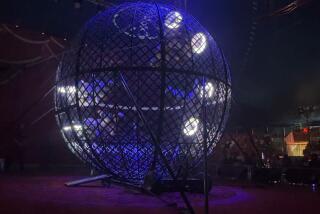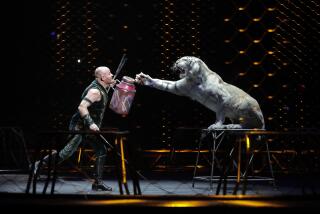CHINESE ACROBATS IN A NEW TWIST
- Share via
Traveling as a Ringling Bros. and Barnum & Bailey star act, the Shanghai Acrobatic Troupe is being provided capitalistic perks that most people back in China can only dream of.
For a grueling 27-city tour that comes to the Anaheim Convention Center today, the Chinese are housed in a custom-fitted train car, complete with a two-wok kitchen for the troupe’s cook from Shanghai, a refrigerator with ice-cube maker, a washer and dryer, color television and a full VCR setup stocked with Hong Kong kung fu movies.
These perks are all part of the business deal that Ringling president Kenneth Feld made last year in Peking with the official Performing Arts Agency of the People’s Republic.
The venture is part of a larger trend nurtured by China’s Communist government in the post-Mao era: dealing unabashedly in profit-making collaborations with Western private entrepreneurs, ranging from oil explorations off the China coast to a planned Club Med resort in Guangdong Province.
The Ringling tour represents a new twist for Peking: dispatching acrobatic troupes to play the U.S. amusements circuit, including such theme parks as Disney World, Six Flags Great Adventure, Astroworld and Six Flags Magic Mountain.
“Now, this is business for us--organization to organization, not government to government, not only for cultural exchange,” said Zhu Dekang, director of the Shanghai Acrobatic Troupe, which will appear with the circus in Anaheim through Aug. 5 before moving to the Los Angeles Sports Arena Aug. 7-17.
Mark Wilson, whose North Hollywood firm books Chinese troupes for the Six Flags parks, including the Chongqing acrobats now at Magic Mountain, explained it this way: “Peking wants foreign dollars like everyone else. They want the troupes to become more self-supporting.”
The Shanghai troupe itself was something of a trailblazer for China. In 1980, a year after diplomatic relations were established, the troupe made an eight-city U.S. theater tour--including New York’s City Center Theatre and Washington’s Kennedy Center--that was billed as the first acrobat tour group from the People’s Republic.
And last year the troupe became one of China’s regulars on the theme park circuit, performing all summer at Astroworld in Houston and for two weeks in October at Six Flags Magic Mountain in Valencia.
Feld said that Ringling is paying more than $1 million to present the Shanghai troupe this year. “They’re the best in China. We consider it a real coup--the first performing group the People’s Republic has allowed to tour with an American show organization,” said Feld, who noted that Ringling had been trying to land a Chinese acrobatic troupe for the past decade. But, he added, “I don’t think they fully realized the magnitude or pace of this kind of American show.”
Indeed, Ringling aides on the tour said the Chinese troupers have been suffering from a double dose of culture shock: Circus life is as foreign to them as the American way of life.
For a troupe that rarely tours in China, and then hardly on the Ringling scale, the touring pace and number of stops have presented a wholly new experience.
(There have been two 11-acrobat units from Shanghai on the Ringling tour--each signed for six months. The first joined Ringling in Florida in January and played the entire Eastern Seaboard; the current troupe will appear mostly in cities of the Southwest and West.)
Also, the Chinese, whose own theater in Shanghai is a 1,650-seat facility, find the vast size of U.S. arenas, the more rambunctious audiences and the frenetic three-ring format a jarring experience, troupe director Zhu said.
“It’s been tough on them, because our setting is a lot more free-wheeling, less controllable. They found that everything, including entire staging set-ups, changed drastically from city to city,” said Ringling assistant general manager Michael Melssen.
Zhu said his acrobats were still taken aback by the lavish scale of the Ringling operation. In China, he said, his troupe is the only act on the bill, and the emphasis is on finesse rather than stage dramatics.
“This is different for us,” said Zhu before a recent appearance at the 14,000-seat Long Beach Arena. “We’re not used to such size and so much activity and everything happening at one time. Here, you need more than two eyes to see us.”
And the audiences in the U.S., Zhu said, allowing himself a slight smile, are different, too. “Your audiences are not as quiet, I believe.”
Still, the Chinese ensemble has managed to impress American circus audiences with balancing and other skills of an artfully precise style rarely seen in the United States.
As one admirer, Ringling ringmaster Jim Ragona described it: “It’s a tradition, a whole philosophy with them. They’re more artistic, there’s something ballet-like about what they do. It’s less physical, more metaphysical.”
And there are other compensations for the Chinese troupers, besides the praise from show business professionals.
Once isolated from Western circuses, the Chinese now have a chance to study some of Ringling’s most celebrated acts, such as Mexico’s Flying Vazquez trapeze artists, Spain’s high-wire Quiros Troupe and American tiger trainer Wade Burck.
“We can’t get too close--they (the Chinese) speak almost no English. But, you know, we get along fine with sign language and demonstrating. It’s still a (circus) family feeling, in a way,” said Burck.
But it’s the sightseeing tours--another of the perks guaranteed by Ringling--that seem to fascinate them most. Along the circus route, they have toured just about every major historic, corporate and entertainment monument from New York to California, including Washington’s Capitol, Williamburg’s colonial town, Wall Street’s Stock Exchange, Disney World’s Epcot Center and San Diego’s zoo.
And a cigarette factory in Greensboro, N.C.; a computerized newspaper facility in Richmond, Va.; the mansions of the upper crust in Palm Beach, Fla.; the rodeo in Oklahoma City; an air-conditioned shopping mall in Phoenix.
With so much exposure to American life do Chinese officials worry about possible defections on the Ringling tour? Especially in light of the spate of well-publicized Chinese defections in the early 1980s?
Zhu, the Shanghai troupe director, dismissed the prospects of defections as “not very likely.”
He said that China’s emigration policy has been relaxed somewhat, adding that some troupe members have been permitted to “resettle” in Japan and Australia.
According to Feld, the Shanghai troupe has already agreed to a Ringling tour next year that will cover a different route, including many cities in the Midwest.
Zhu, sizing up the circus as a business venture, put it this way: “This circus is very good, even if it (the production style) is not ours. It is very big, very colorful. This is what Americans like, isn’t it?”
More to Read
Sign up for The Wild
We’ll help you find the best places to hike, bike and run, as well as the perfect silent spots for meditation and yoga.
You may occasionally receive promotional content from the Los Angeles Times.






